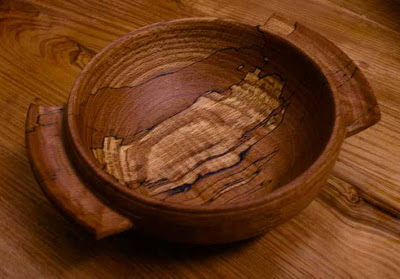Well the porringers I was making 6 weeks ago when I started this blog are now dry and ready for oiling. I am often asked what are the best oils to treat wood for food use and have experimented with many over the years. Dry wood is like blotting paper and would absorb any liquid food you put on it, the oil blocks up the pores and makes it waterproof so that it is easier to clean. The important thing is that the oil should be one that cures or dries in the wood. This rules out common food oils like olive and sunflower which always stay liquid and can go rancid giving the bowl an unpleasant smell. One of the best oils is walnut, I used it for about a year and it works really well, it smells gorgeous, is not too expensive and easily available from most supermarkets or wholefood suppliers. I only stopped using walnut due to the potential problems for nut allergy sufferers. If I was treating an odd bowl for my own use it would still be my oil of choice but since I am selling bowls and many are given as gifts its just too complicated. For many years I used organic palm oil but I stopped due to environmental concerns. Eventually I followed the lead of folk who use woodware daily in Sweden and bought some cold pressed linseed oil. This is the most expensive oil I have used so far at over £5 a litre and some folk do not like the smell but I believe it does a very good job.

I heat the oil in a deep fat fryer and dip the bowls in, let them drain for a minute then wipe any excess off. I love this part of the job since the oil brings all the colours out in the wood and this batch of bowls from the old beech tree are particularly good looking. I am sure someone will enjoy eating their breakfast from this one.



I live in an area where the tap water is filled with some rather caustic stuff, and tends to dry out the wood. Should I only use walnut oil or linseed oil to re-coat the wood, then?
The bowls do not need re-oiling from a functional point of view. What you see, the “drying out”is only the surface. We wash ours in hot water with detergent along with everything else and the detergent strips some oil out of the surface and leaves them looking dry. I have plates that have been washed every day for 10 years and not been re-oiled, they are beginning to look like old ones and I like it.If you want to keep them looking brighter then a little oil occasionally will do that, I would recommend walnut, just a little wipe it on leave it a minute then wipe off the excess.
Awesome. I just wasn’t sure if it was supposed to do that. Thanks!
This sounds great! How hot do you get the linseed oil? Also, how does cold pressed compare to the easily available BLO (boiled linseed oil). My big concern would be flammability of overheating the oil in a fryer.Thanks
Boiled linseed has heavy metal drying agents added which are poisonous so it is not for food use. We bought our first cold pressed linseed in Sweden where linseed is as highly regarded as olive oils with many varieties being sold and even single estate oils. The best I have found in the UK is sold as a horse feed additive, simple cold pressed linseed, nothing added and nothing taken away.
what is the best oil to use to waterproof and make a bowl where i can eat out of it the bowl is made out of cherry